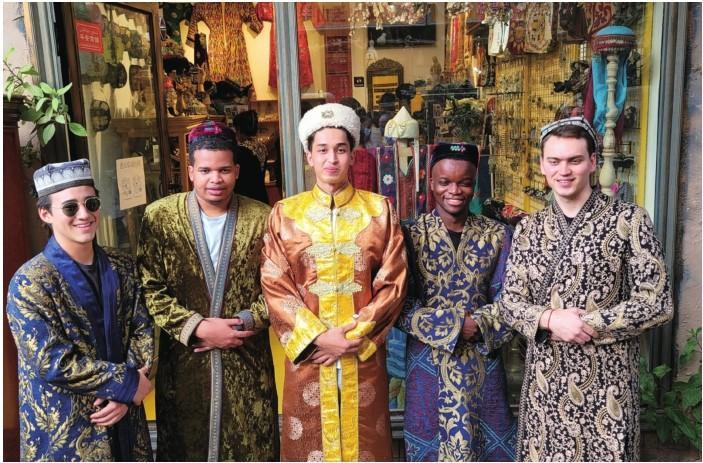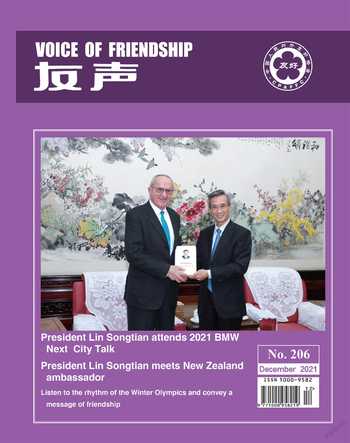Overseas students from Peking University visit Xinjiang
2021-01-22CaiYunzhe
Cai Yunzhe
T o give the world a more authentic, comprehensive and objective understanding of China, the Chinese People’s Association for Friendship with Foreign Countries and Peking University jointly organized 20 overseas PKU students from 16 countries in Asia, Africa, Europe and the United States to visit the cities of Kashgar, Hotan, Urumqi and Shihezi in the Xinjiang Uygur autonomous region from Oct 1 to 6.
Li Xuejun, deputy secretary of the Leading Party Group of the Standing Committee of the People’s Congress of the region and deputy director of the committee, met with the delegation. Zumrat Obul, deputy director of the Standing Committee of the region’s People’s Congress accompanied the delegation throughout the tour.
Xinhua News Agency, People’s Daily, China Media Group, China News Service, China Foreign Languages Publishing Administration, China International Television, Xinjiang TV and Xinjiang Daily covered the visit.
Students from various countries walked into villages, factories, schools, cotton fields, and bazaars to experience Xinjiang’s social stability, ethnic unity, economic development and overall happiness. They presented what they saw to their families and friends through oral communication and made it known to the world through social media.
Xinjiang has a stable society, abundant goods and contented people
Lusine Safaryan from Armenia saw the satellite factory built near villages. He said, “Rural residents in Xinjiang can find jobs near their home, working eight hours a day. That allows them to take good care of the elderly and children in their families while earning a considerable salary. Moreover, the working conditions are good. They are really happy.”

After watching farmers drive large cotton-harvesting machines, Joseph Olivier Mendo’o of Cameroon said, “Xinjiang’s cotton planting and production applies a plethora of technologies such as drip irrigation and mechanized picking, which no longer requires too much manpower. I haven’t seen any ‘forced labor’ as described by some Western media. This experience also shows that we should not jump to conclusions about many things, but should go and have a look and experience them personally. Rather than believe the reports of certain Western media outlets, I trust my own eyes more.”
After visiting peaceful Siksan village in Hotan, Thomas Donglona Adawa from Chad said, “I didn’t expect Xinjiang’s new villages to be so beautiful. The villagers are beautifully dressed, and their doorways, streets and alleys look clean. During the visit, I saw that the Xinjiang farmers are full of confidence. I hope the farmers in my hometown can also do so well and live such a happy life.”
At the end of the visit, Abderemane Younoussa from Comoros said, “As I came to Kashgar and Hotan, I felt the happiness of the people in Xinjiang. The happiness index is high. I will share what I have seen, heard and felt here with my families and friends.”
Xinjiang has diverse cultures and freedom of belief
Knowing that the Chinese government had invested heavily in rebuilding the ancient city of Kashgar under the concept of “repairing the old as before and rebuilding the original site”, Yasin Rahim, a student from Pakistan, said, “I am touched that the Chinese government attaches so much importance to protecting and inheriting the traditional culture of all ethnic groups.” After talking with the trainees in the education and training center, he said, “Some parts of my country also suffer from religious extremism. This Chinese lad is leading a happy life through vocational education and training. I am very happy to see the way he lives today.”
At the square in front of the Id Kah Mosque, the scene of children running after doves fascinated the overseas students. Mubarak Mugabo from Uganda had just finished prayers with his Muslim classmates. He said, “I feel that there is no racial discrimination in Xinjiang. Worship in the mosque makes me feel at peace.”
In an exchange with the local representatives, Alexandra Pozhidaeva from Russia said, “Xinjiang is located in northwest China. It was once an indispensable stop on the ancient Silk Road. Today, Xinjiang has established a well-connected three-dimensional network under the Belt and Road Initiative. It has become an important bridge connecting China and the rest of the Eurasian continent. Every road we pass and every person we meet shows us how inclusive, developing and prosperous Xinjiang is today.”
Sunny Md Mahedi Hassan, a student from Bangladesh, said, “It is difficult for people of different cultures to enjoy the present with a common understanding. Xinjiang has shown that it can be accomplished. The support of the CPC and the Chinese government is essential. Since ancient times, exchanges between different ethnic groups in China have been expanding and the degree of integration has been deepening. It has formed a symbiotic and complementary pattern. Now we have truly understood the profound meaning that Han people cannot live without ethnic minorities, ethnic minorities cannot live without Han people, and ethnic minorities cannot live without each other.”
Xinjiang has rustic customs and beautiful sceneries
In the Fragrant Imperial Concubine Garden in Kashgar, Alexandra from Russia and Sapargeldi Amangeldiyev from Turkmenistan were invited to play the bride and groom in a performance of the unique Uygur wedding custom. Sapargeldi said excitedly, “The experience of playing a bridegroom in Xinjiang is unforgettable. It gave me a feel of the Xinjiang people’s happy life.”
In the ethnic musical instrument village of Shufu county, the overseas students were treated to a feast of Xinjiang songs and dances and experienced the charm of the Twelve Muqams, a representative item of world intangible cultural heritage. Wickramasinghe Himasha Lakmini from Sri Lanka said, “The performance is great! I filmed it all on my phone and sent it to my family and friends!”
Every now and then, local residents and tourists from all over the country greeted the overseas students or requested a group photo. Some Uygur children even played football with the foreign students. Martin McAllister Francis, a student from the UK, said,“The people here are very warm and friendly. We felt very welcomed.”
At the Populus Euphratica Ecological Scenic Spot in Hotan, a natural lake is surrounded by an expanse of sand. The rippling emerald lake water shimmers by the golden sand beach. The overseas students were fascinated by the amazing scenery. Exclaiming that “seeing is believing”, they also gained a deeper understanding of Xinjiang people’s adherence to the philosophy that “lucid waters and lush mountains are invaluable assets”.
杂志排行
Voice Of Friendship的其它文章
- The Seagulls of Salt Lake City:Helen Foster Snow and China
- Listen to the rhythm of the Winter Olympics and convey a message of friendship
- A review of exchanges between Baoji and ROK in 2021
- 2021 GD Youth Link:3rd Guangdong International Youth Sports Dialogue held in Guangzhou
- Pacific China Friendship Association members issue joint statement to the WHO opposing politicization and stigmatization in COVID-19 origin-tracing
- Friendship organizations in China,Africa appeal to WHO over origin tracing of COVID-19
